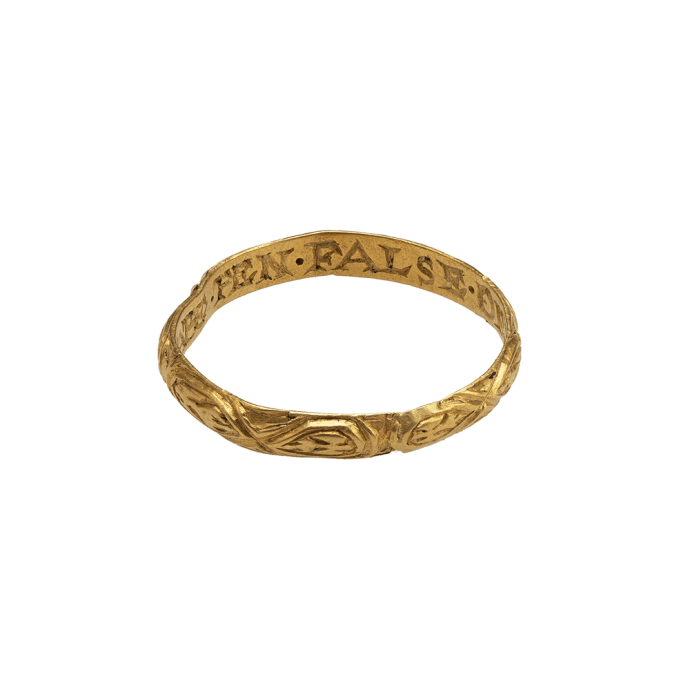


Posy Ring “RATHER · DEATHE · THEN · FALSE · OF · FAYTHE”
, England, 17th-18th centuryPosy Ring “RATHER · DEATHE · THEN · FALSE · OF · FAYTHE”
Description
An ornamented gold band with D-section inscribed on the interior in Roman capitals “RATHER · DEATHE · THEN · FALSE · OF · FAYTHE,” with the “TH” conjoined. The exterior of the hoop is engraved with four figures eight, each containing a floral motif. Traces of black enamel are visible in the relief decoration. The ring shows signs of wear through age and is in good wearable condition.
Provenance:
Found near Wendlebury, Oxfordshire, in 2019, the ring is recorded on the Portable Antiquities Scheme database (BUC-786085) and is disclaimed as treasure (Ref: 209 T1188).
Literature:
“Posy rings,” their name deriving from the term poesie or poetry, are rings inscribed with mottos either in prose or verse. They often concealed love messages inside their hoop, like here, which were only known to the giver and recipient. They find mention in the plays of William Shakespeare, such as Hamlet and the Merchant of Venice. Posy rings enjoyed great popularity in Britain throughout the seventeenth and eighteenth centuries. They were traditionally exchanged between relatives, friends, lovers, and were often given as betrothal or wedding rings.
The posy here, “RATHER · DEATHE · THEN · FALSE · OF · FAYTHE,” is recorded with alternative spellings and scripts by Evans (p. 90). A ring with a similar posy and maker’s mark belongs to the British Museum (inv. 1961, 1202.107). This posy and related examples, such as “Rather die than faith deny,” can be interpreted as declarations of commitment to one’s partner or religion, even in the face of hardship.
For a history of posy rings with extensive examples ranging from the medieval period to eighteenth century, see: Scarisbrick 2021 and further information on posies: Evans, 1931; Anon., A Garland of Love: A Collection of Posy-Ring Mottoes, London 1907; Dalton 1912, pp. 174 ff.; Scarisbrick 2007, pp. 74 ff., Taylor and Scarisbrick 1978; Oman 1974, pp. 39 ff.